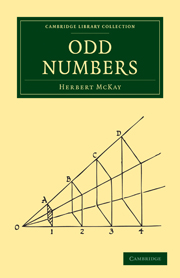Book contents
- Frontmatter
- Contents
- CINDERELLA IN GLASS SLIPPERS
- Millions & Billions & Trillions
- Great Powers & Little Powers
- How we got Logarithms
- Proportion
- Comparisons
- Proportion in Triangles
- Weights & Measures
- The Delusive Average
- Approximations
- Multiplication & Division
- Tables
- Units
- Oddities of Numbers
- The Construction & Solution of Problems
- Scales of Notation
- Frontmatter
- Contents
- CINDERELLA IN GLASS SLIPPERS
- Millions & Billions & Trillions
- Great Powers & Little Powers
- How we got Logarithms
- Proportion
- Comparisons
- Proportion in Triangles
- Weights & Measures
- The Delusive Average
- Approximations
- Multiplication & Division
- Tables
- Units
- Oddities of Numbers
- The Construction & Solution of Problems
- Scales of Notation
Summary
If anyone thinks he has no use for arithmetic let him consider the number of comparisons he makes every day. Most comparisons involve the working of some sort of sum; even when we compare colours we are apt to make some kind of computation of the proportions of the primary colours in them. We are always making comparisons, well or ill, accurately or inaccurately; one of the virtues of arithmetic is that it enables one to make comparisons neatly and accurately. One is proud of having a sense of proportion, and proportion is essentially mathematical—it is a comparison of sizes measured in some way or other. Even where arithmetic does not enter directly and obviously into a comparison a knowledge of the possibilities of arithmetical comparison is not amiss; it does at least rule out many crudities and absurdities.
I saw some time ago the statement that if all the herrings landed at Yarmouth in a season were placed head to tail in a line they would stretch nine times round the world. The writer had evidently been impressed by the vast number of herrings in the catch, and he had looked for a comparison that would show the immensity of the number of herrings. As we have already seen, if we want to make the most of a large number of objects, we place them in a line. We get the greatest possible length by placing the herrings head to tail, and that is what the writer had done.
The idea of placing the herrings in a nine-deep queue right round the world might be impressive if we once began to realize what such a queue means.
- Type
- Chapter
- Information
- Odd Numbers , pp. 61 - 81Publisher: Cambridge University PressPrint publication year: 2009First published in: 1940



